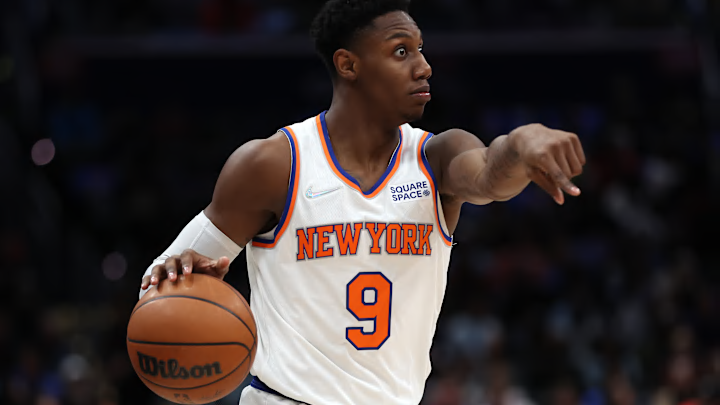Comparing RJ Barrett and Kevin Porter Jr’s Careers
Career and year-by-year comparison of RJ Barrett and Kevin Porter Jr per game stats pic.twitter.com/Tyfd4MjySN
— N.B. Lindberg (@nblindberg) August 30, 2022
When comparing RJ Barrett and Kevin Porter Jr over their first three seasons, two things are readily apparent. The first is that Porter has shown far better passing than Barrett. Part of that is role-dependent, but talent usually guides role. The second is that Barrett has been able to shoulder a larger scoring load. Once again, that’s likely role dependent. Could the two switch that dynamic in a different environment? Certainly, but we can only work with what we have.
The other small differences are: Kevin Porter Jr has been the slightly more efficient shooter but has gotten to the free throw line less, Barrett has a real rebounding edge but neither add value there, and Porter’s ability to generate steals is nearly double that of Barrett’s, although neither have been defensive stalwarts.
🚀🚀🚀 KEVIN PORTER JR, FOR THE WIN! 🚀🚀🚀 pic.twitter.com/iP7Q0w07AR
— NBA (@NBA) January 6, 2022
However, there are a few caveats that favor Barrett. He has played significantly more games (198 to 137), started far more of them (197 to 87), and played significantly more minutes per contest (33.5 to 28.5). When and how much a player plays is an important data point to consider. Barrett has spent his entire career going against NBA-level starters, while Porter has faced far more second units.
All that being said, if you did a blind taste test of their first three seasons, you’d be hard pressed to find a general manager with a strong opinion on who was better. They’d likely look at the numbers and ask a laundry list of questions, like, “how tall are they? What positions do they play? How old are they? Let me see their shot chart. Am I picking this guy for a particular roster?” The point is, if two things side-by-side raise more questions than answers, then you’re probably looking at the same thing.
Digging into the advanced metrics does little to separate the two. They both have a career 102 offensive rating, which is significantly below league average over the past three seasons, and they both have a -1.2 offensive BPM. Barrett has the edge in defensive metrics, but that comes with a caveat.
Defensive metrics, even the newest, shiniest and best ones, have a hard time stripping out the effects of your teammates. In Barrett’s rookie season, the Knicks had the 23rd-ranked defense, the next season, it jumped to third, and last season it was 11th. Porter, on the other hand, played for the Cavaliers and their 29th-ranked defense as a rookie, then the Rockets’ 27th-ranked defense in year two, and last season the Rockets finished 29th.
Barrett’s defensive impact might be better than Porter’s, it could be significant, but it also helps that he has played on significantly better defensive teams. Making a definitive statement over who was the better defender based on metrics would be incredibly speculative at this juncture.
